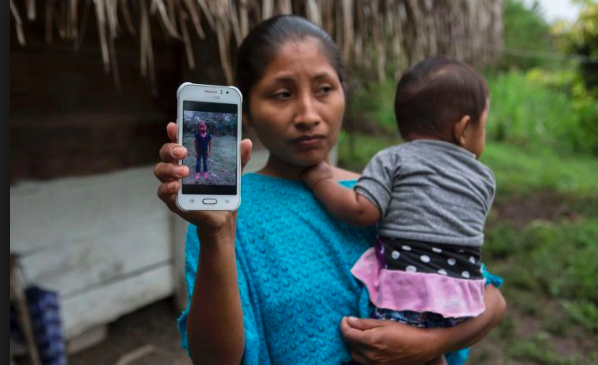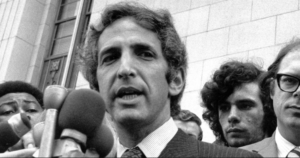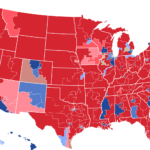The following might seem like a hyperbolic statement, but I will attempt to explain why, in December of 2018, it is anything but: The power of Christmas is fading in — and from — American life.
Yes, the cultural centrality of Christmas remains extremely strong in the United States. A religious celebration for some Americans is a winter holiday for almost the entire country. Few occasions still inspire more frenetic activity or celebratory joy. Christmas, as a cultural presence in this country, is still king. Americans desperately want to please their children at Christmas. They just as eagerly and earnestly want Christmas to be a time of peace and happiness, a time when they can feel a little bit better about themselves and the world. This is why fallen-away or occasional Catholics or Christians go to religious liturgies at Christmas after not going to services for most of the year. Christmas still inspires a hope and calls forth a yearning to want to be better… and feel better.
This is good. We should all want to continue to do better and feel better. We should seek a refuge from life’s troubles. We should want to explore where — and how — we can find safe space in a difficult and unfair world. Christmas, purely on a cultural level, still contains a lot of power… and that’s good.
Where this country struggles, however, is in the process of making the Christmas story itself — the journey of The Holy Family (Mary and Joseph and their son, Jesus) — directly applicable to modern life. In that specific way, the power of Christmas is fading.
Why? How?
My simple answer: Jakelin Caal.
You have certainly heard by now of the 7-year-old Guatemalan girl who died after crossing the U.S.-Mexico border. All the predictable political fights and verbal skirmishes exploded after this incident. I am not here to litigate who is responsible, because this is not about the particular person who occupies the office of President of the United States. Sure, one can say that certain points of emphasis have become more prominent under Donald Trump than under Barack Obama, but the people who report on and study immigration into the United States would almost unanimously tell you that what happened under Obama made it easier for Trump to do what he has done. Trump has not reversed or undone most of Obama-era immigration policy; he has accelerated it. Assigning blame misses the mark as a matter of policy, but it also focuses on individual persons instead of culture.
That’s where Christmas comes back into this picture.
The Department of Homeland Security. ICE. The President of the United States. Border Patrol. The Mexican government. Central American governments. While pundits and political partisans argue about the various levels of responsibility these entities bear for Jakelin Caal’s death, and the other deaths by illegal immigrants when attempting to cross the border into the United States, let us rise above those talk-show-level food fights and make this larger point: A healthier culture would create a very different world on this and related issues.
Imagine, if you will, a world in which illegal immigrants, when arriving at a border checkpoint, are met with smiles from Border Patrol agents, and a phalanx of social workers fluent in Spanish are there to welcome them into not a cold and unpleasant facility with few windows or comfortable accommodations, but instead a building with plush chairs, soft mattresses, beautiful artwork, and festive music.
The point of guiding you through that process of visualization is not to insist that the United States Government should structure its immigration/border response that way (though I would in fact support such a change in how our government handles its business). The point is simply to emphasize how an attitude, a culture, can produce a very different sense of awareness in any realm of human activity.
Let’s realize that, given the complexity of illegal immigration in all its forms, it might be necessary to turn back illegal immigrants in various circumstances. I wouldn’t personally advocate for that approach in most cases, but I can allow — as a point of political disagreement in a complicated world — that many people with views different from mine would see the need to turn back illegal immigrants as a necessity.
Let’s run with that hypothetical — namely, that most of the illegal immigrants processed at the border still could not relocate in the United States. Let’s accept that for the sake of argument here.
Let’s accept that most illegal immigrants are turned back… but that they are turned back in a facility with the soft beds, and the windows, and the art, and the music, and a lot of smiling faces.
Can we realize, in and through the prism of Christmas, that if we are going to make tough decisions, can we at least make them in a context of still welcoming the stranger, the foreigner, the other? The act of “welcoming” might not be complete, but we would at least give those many illegal immigrants an experience at the border which contains a measure of warmth, a measure of comfort, a measure of familiarity, and not the supremely traumatic or confrontational (or both) experience so many parents and kids must currently deal with?
In other words — and I am speaking to my conservative friends here — can’t we at least change attitudes toward illegal immigrants not to the extent that we let them in, but to the extent that we offer an empathetic and gentle initial welcome to a border facility and the governmental processing that facility must host?
More simply, while I can understand that we might need to tell an illegal immigrant family, “NO, you can’t come here,” can’t we at least convey that “NO” without first magnifying and multiplying the traumas that same family has already endured to get to the border?
People on opposite sides of the immigration issue do agree on one thing: The Trump Administration is focused on making the process of border crossing as hard as realistically possible for would-be immigrants, to disincentivize future attempts at border crossing. The disagreement between or among people on different sides of the immigration issue is whether that reality is a feature or a bug, a positive or a negative.
I would very simply submit, then, that if our culture was more powerfully and centrally guided by an awareness of Christmas, we would not — as a government or as a culture — want to make the experience of border crossing more arduous or traumatic.
We might want to discourage it, perhaps, but if people chose to do it anyway, a Christmas response — a Christian response — would NOT be to make the process harder. The Christian response would be — at a minimum — to make the process less traumatic, but still say “NO” in terms of allowing the family into the country. The Christian response, in a more maximized form, would be to allow the family into the country and find ways to gently usher that family into American life.
At the very least, though, let’s get that first — and minimal — part right: reducing trauma even if we choose, as a government, to keep a family out of this country.
The Christmas story is not ambiguous here: Two parents and their newborn child were displaced and on the run. They were not wealthy. They had no room at the inn. Other human beings did not feel it important enough or valuable enough to take them in and give them a warm bed or a hot meal.
“Away in a manger, no crib for a bed
The Little Lord Jesus lay down His sweet head”
It is not a peripheral or merely minor or accidental side note that the Son of God, the Prince of Peace, the King of Kings and Lord of Lords — the things we sing about in Handel’s majestic Hallelujah Chorus each Christmas season — was a lowly little child surrounded by farm animals in a supremely humble setting. God becomes one of us — at a lowly level and in a supremely vulnerable way. This is why religious conservatives quite rightly and nobly decry abortion as a profound moral evil. God was, before anything else, a child in the Christmas story. He was innocent, He was vulnerable. He was human. Defending innocent life is at the center of Christianity, and Christmas centrally underscores that point.
If Christmas really has power in our country, this appropriate desire to defend innocent life will extend from anti-abortion advocacy to a similar advocacy for all the many, many Jakelin Caals — all these 7-year-old Guatemalan or Honduran or Nicaraguan kids who have done nothing wrong and deserve, as precious creations of God, a life that is whole and healthy and happy.
If Christmas really did inform our attitudes and our culture — especially as manifested in our government’s treatment of illegal immigrants — we would build facilities with the soft beds and the art and the comforts we would want any family to have, regardless of the final decision on whether to let that family relocate to the United States. That would be the unambiguously Christian response.
I was taught for 12 years by Jesuits. James Martin, S.J., stands squarely within the Jesuit Catholic tradition and the Catholic Church’s teachings on immigrants and refugees in this article and this tweet below:
https://twitter.com/jamesmartinsj/status/814112724443680768?lang=en
The power of Christmas remains strong and undiminished as a cultural and secular holiday in America, but in terms of being a guide and inspiration for a specifically Christian and humane attitude toward lowly and powerless individuals, the power of Christmas has profoundly decreased.
In a society truly governed by the Christian nature of Christmas and the Christian identity of the one called Christ — Jesus of Nazareth — innocent children such as Jakelin Caal would not die. Families would not be traumatized or met with a confrontational response at the United States-Mexico border. Even if our government had to tell those families “NO,” it would at least offer that answer after providing many days of safe and inviting space, comfortable living conditions, good food, and a lot of empathy for their plight.
If the power of Christmas is real, we might not change everything about our policies or the results they generate, but we should certainly be more humane, gentle and spacious in the attitude we bring to our policies… and the people affected by them.
People such as Jakelin Caal.
Merry Christmas to ALL… not just some. That sentiment, in many ways, shows how Christmas can regain a measure of the power it has lost as a source of moral and religious inspiration in this country.













